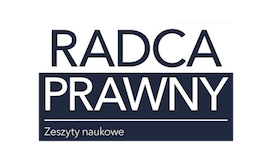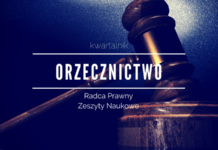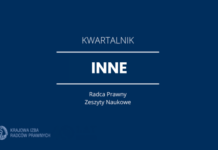The goal of this article is to analyze and evaluate the phenomenon of professional secrecy of attorneys-at-law and their independence. This article is a result of the author’s particular interest in the issues concerning the independence of attorneys-at-law and its limits. The essence of this publication is to illustrate the complexity of this phenomenon.
The author tried to pay special attention to situations in which the obligation to maintain professional secrecy is subject to restrictions resulting from the specific nature of particular types of proceedings – primarily criminal proceedings, but also proceedings in the field of competition protection. The author also points out the consequences that an attorney-at-law faces for violating the obligation to maintain professional secrecy.
1. Nature of the independence of attorneys-at-law
An attorney-at-law is a legal practitioner who provides legal assistance and in the course of his/her professional activity provides legal advice and consultation, prepares legal opinions, and appears before courts and other authorities as an agent or defender. The activities of an attorney-at-law are designed to protect the interests of those for whom they are carried out.
The profession of attorney-at-law can be practiced by persons who have met the requirements set forth in detail in the Act of 6 July 1982 on attorneys-at-law,[1] i.e., first and foremost by a person who has graduated from a higher legal education institution in the Republic of Poland and holds a master’s degree or a foreign degree recognized in Poland, enjoys full public rights, has full capacity to perform acts in law, has completed training for attorneys-at-law in the Republic of Poland, and passed the exam for attorneys-at-law. In addition, the profession of attorney-at-law is included in the so-called “public trust professions”, which is characterized, inter alia, by the importance of the proper practice of the profession in accordance with the public interest, receiving personal information entrusted by persons using attorney-at-law’s services, recognizing such information as a professional secret as well as providing attorneys-at-law possessing such information with immunity which releases them from criminal liability for non-disclosure. In its judgment of 26 November 2003, the Constitutional Tribunal indicated that a profession of public trust is a profession that consists of serving personal human needs, involving the obtaining of information about personal life, and organized in such a way as to justify the public’s belief as to the proper use of this information in the interests of individuals by those providing the services.[2]
According to Article 17 of the Constitution of the Republic of Poland, supervision over the proper practice of the public trust professions includes control and supervisory activities undertaken by the professional self-government bodies.[3] The Minister of Justice supervises activities of the National Bar of Attorneys-at-Law on the basis of Article 5.3 of the Act on Attorneys-at-Law under strictly defined situations. He [or she] may also order the institution of proceedings.
Pursuant to Article 6 of the Act on Attorneys-at-Law, the provision of legal assistance consists, in particular, of giving legal advice or consultations, drawing up legal opinions, appearing before courts as an agent or defender, and preparing draft legal acts.[4] The preamble to the Code of Ethics for Attorneys-at-Law stipulates that an attorney-at-law should serve the interests of justice and those who have entrusted him/her with the protection of their rights and freedoms. This is a public trust profession, which respects the ideals and ethical obligations shaped in the course of its practicing.[5] In their activities, attorneys-at-law must always be guided by the law, fulfill their duties conscientiously, and maintain professional secrecy. In the course of his/her professional activity, an attorney-at-law enjoys freedom of expression, and his/her independence is a guarantee for the protection of rights and freedoms. An attorney-at-law can work under an employment relationship, under a civil law contract – in the law firm of an attorney-at-law as well as in a civil law partnership, a general partnership, a limited partnership, or a limited joint-stock partnership. The indicated provisions are protective in nature and provide a guarantee of independence for the profession. Certainly, an attorney-at-law will be subject to the provisions of the labor law, and thus will be obliged to diligently perform work for and under the direction of the employer, but this regulation is partially limited by Article 13 of the Act on Attorneys-at-Law indicating its independence.
The goal of this publication is to present the issue of the independence of attorneys-at-law and to show the complexity of their professional secrecy obligation, whose regulation may vary depending on the type of proceedings.
2. Professional secrecy of attorneys-at-law
Article 13 of the Act on Attorneys-at-Law provides for their independence, stipulating that attorneys-at-law are not bound by instructions as to the content of a legal opinion.[6] This regulation is inextricably linked to the above claim that this profession is one of public trust. An attorney-at-law must act professionally when preparing a legal opinion and using information obtained from the client. Practicing a public trust profession involves obtaining information about the personal lives of individuals. It is the duty of an attorney-at-law to maintain professional secrecy in order to build a relationship with a client – all information learned by the attorney-at-law in connection with giving legal advice is covered by this obligation. Thus, an attorney-at-law is obliged to keep any information acquired in connection with the performance of the professional activities secret, regardless of the source of the information, its form, or the manner in which it was recorded. The Constitutional Court drew attention to the issue of the provision by clients to attorneys-at-law of information concerning their personal goods and interests as well as to the importance of maintaining its confidentiality. In order to properly provide legal assistance to a client, it is necessary to obtain all the necessary information from the client.[7] The obligation of an attorney-at-law to request a representative of the National Bar of Attorneys-at-Law to participate in a search of the attorney-at-law’s premises, set forth in Article 18 of the Code of Ethics for Attorneys-at-Law, is intended to guarantee the security of professional secrecy.[8]
Furthermore, an attorney-at-law is obliged to safeguard the information that is subject to professional secrecy. Any documents or media carriers containing such information must be stored in such a way as to protect them from damage, unauthorized access by third parties, or loss, and associates should be made aware of the confidentiality of the information and instructed about the appropriate legal liability.
Pursuant to Article 21 of the Code of Ethics for Attorneys-at-Law, an attorney-at-law is obliged to keep the course and content of settlement negotiations in which he/she has actively participated secret, also from courts and other bodies adjudicating in the case.[9] On the other hand, Article 19 of the Code of Ethics for Attorneys-at-Law stipulates that an attorney-at-law should take all measures envisaged by law in order to avoid or limit his/her exemption from the obligation of professional secrecy provided for in the legal regulations.[10]
Therefore, the attorney-at-law will not be bound by an order regarding the content of a legal opinion, regardless of who gave it. To avoid misunderstandings between the attorney-at-law and the law firm in which he/she works, it will be necessary to refer to § 16 of the Rules of Practicing the Profession of Attorney-at-Law, stipulating that the law firm and the attorney-at-law provide legal assistance and, as part of this activity, should agree on the rules for providing such legal assistance. Unlike a legal opinion, in a legal brief, the attorney-at-law can only include one-sided arguments.[11]
Another regulation pointing to the independence of attorneys-at-law is Article 7 of the Code of Ethics for Attorneys-at-Law (CEAL) stating that: independence in the practicing of the attorney-at-law profession is a guarantee for the protection of civil rights and freedoms, a democratic state ruled by law, and the proper functioning of the administration of justice.[12] Section 2 of the CEAL stipulates that attorneys-at-law, in the performance of their professional activities, should be independent of all influences arising from, inter alia, external pressures, personal interests, or interference from any party or for any reason. Instructions, suggestions, or directions which limit that independence may not affect the attorney-at-law’s position in the case. The attorney-at-law may not violate the rules of professional conduct or improperly perform his/her professional duties in order to meet the expectations of his/her client or third parties.[13]
The independence of an attorney-at-law in his/her professional activities is, therefore, one of the core values and thus, the attorney-at-law may not be subjected to any influence, including of a financial nature. He/she must also not succumb to external pressure, whether exercised by family members or persons in the public sphere such as politicians. The position taken in a particular case or expressed in a legal opinion should be based on his/her views, and loyalty to the client must not affect his/her independence. Of course, the attorney-at-law should respect instructions received from the client on whose behalf he/she is acting, as the client’s will is also of crucial importance. Nor does the principle of independence conflict with the attorney-at-law’s duty to provide legal assistance to those for whose benefit it is being provided.[14]
These topics may raise doubts in the case of attorneys-at-law employed under contracts of employment and attorneys-at-law working in law firms. An attorney-at-law employed under a contract of employment will continue to take a position consistent with his/her own views, and the subordinate relationship between him/her and his/her employer cannot affect the content of his/her opinions. When it comes to attorneys-at-law working in law firms, they work for other professionals that already have some experience with the clients in question. In this case, attorneys-at-law working for other professionals should consult decisions they make with these professionals. As regards trainee attorneys-at-law, the principle of independence will not apply to their relationships with patrons or other professionals for whom they prepare legal opinions, or act in their place in the courtroom. In this case, applicants will, of course, be obliged to follow the instructions of the person with whom he/she is in a relationship of dependence.[15]
Pursuant to Article 178 point 1 of the Code of Criminal Procedure, it will not be possible to question an attorney-at-law (whether appointed ex officio or elected) as a witness about facts that he/she learned as a result of performing the functions of a defense counsel.[16] This evidentiary prohibition applies to attorneys-at-law practicing under civil law contracts, in law firms of attorneys-at-law, or in companies. This rule will also apply to trainee attorneys-at-law who substitute for attorneys-at-law as defense counsels.
3. Maintenance of the attorney-at-law’s professional secrecy
in the course of criminal proceedings
One aspect of the independence of attorneys-at-law is the issue of maintaining secrecy in criminal proceedings. It is clear that the main goal of criminal proceedings is to detect the perpetrator of an act prohibited by law and to bring him/her to criminal responsibility. Both advocates and attorneys-at-law may act as the defense counsel.
The professional secrecy of attorneys-at-law is particularly evident when there is a collision of goods that should be adequately protected. The protection of professional secrecy and its scope is of critical importance. As for the exemption of an attorney-at-law from professional secrecy, this is tantamount to determining whether the prerequisites justifying such an exemption have been met, indicating the authority entitled to grant such an exemption, and specifying the remedies. However, for such exemption to occur, the following conditions must be jointly met: the interests of administration of justice and the inability to establish circumstances based on other documents. Only the court has the authority to grant this type of exemption. In the preparatory proceedings, this decision is made by the court having jurisdiction to hear the case in the first instance (Article 329 of the Code of Criminal Procedure).[17] During the proceedings, the decision is made by the court hearing the case. The court decision releasing an attorney-at-law from secrecy takes the form of a decision, which requires an appropriate justification (Article 98 of the Code of Criminal Procedure).[18] Additionally, certain evidence will be prohibited, and such prohibitions apply, inter alia, to attorneys-at-law.[19]
Article 180 of the Code of Criminal Procedure stipulates that persons who are obliged to keep classified information (“restricted” or “confidential” or related to the practice of their profession) secret, may refuse to testify as to the circumstances covered by the request, unless the court or public prosecutor, for the sake of justice, exempts them from the obligation to maintain secrecy. The parties have the right to appeal against this decision. The attorney-at-law may be questioned as to the facts covered by the professional secrecy only if it is necessary for the sake of justice and such circumstances cannot be established based on other evidence. The decision on the questioning or permission to question is made at the preparatory stage, at a session held without the participation of the parties, within no more than 7 days from the date of service of the public prosecutor’s request.[20]
Three groups of information can be distinguished in connection with this regulation. Secrets related to the practice of the profession or the performance of a function will be crucial in the context of this article. These include all pieces of information that have been obtained in connection with the practice of the profession and are covered by the secrecy obligation. Protection of information may also result from an obligation to the client to not disclose it. As already mentioned above, exemption from the obligation to maintain secrecy is granted by a court decision (or at the request of the public prosecutor, depending on the stage of the proceedings) and two conditions must be cumulatively met: the necessity for the sake of justice and the inability to establish circumstances on the basis of other evidence. The circumstances justifying the exemption shall be set out in detail, fully argued, and stated in the justification. The decision to allow exemption from the professional secrecy obligation is made solely by the court. In the course of preparatory proceedings, such a request may be submitted to the court by the public prosecutor, in which case the court has 7 days to consider the request (a non-mandatory deadline).[21]
The exemption from the obligation to maintain attorney-at-law secrecy depends on the court’s decision – in the case of a positive decision, the attorney-at-law should give the relevant evidence. Regardless of the exemption, however, he/she must exercise caution regarding the content of the statements in order to testify truthfully and necessarily but to avoid revealing any other circumstances.
According to the decision of the Court of Appeal in Warsaw of 15 May 2008, Article 3 of the Act on Attorneys-at-Law obliges them to keep everything they learn while providing legal assistance secret. Documents representing such secrecy will be documents containing contents that the attorney-at-law learned in connection with the provision of legal assistance.[22]
The mere possibility of taking evidence as to the circumstances covered by the secrecy obligation must be preceded on each occasion by an analysis of whether the interests of the judiciary justify the violation of public and private interests protected by law. The court, taking into account the fact that this secrecy constitutes the basis of the practiced profession of the attorney-at-law, must act as a guarantor for the preservation of a proper formula of the proceedings and legitimacy of the request for exemption.[23]
The social importance of public trust professions and the special nature of Article 180 § 2 of the Code of Criminal Procedure, which is a lex specialis for the principle of maintaining professional secrecy, mean that this regulation should be applied each time by courts in a prudent and thoughtful manner, and the prerequisites for exemption from the obligation to maintain secrecy must be interpreted in the strictest way, not being subject to a broadening interpretation. When requesting an exemption from the obligation to maintain professional secrecy, the public prosecutor must not forget that the burden of proving the validity of this request will lie with him/her.[24]
The exemption of a witness from professional secrecy under Article 180 of the Code of Criminal Procedure and the possibility of using documents containing professional secrecy as evidence as set forth in Article 226 are two separate issues. If the prosecution sees a need to obtain documentation that it suspects is held by an attorney-at-law, it should first apply for its release under Article 217 of the Code of Criminal Procedure, and only after that (if the attorney-at-law believes that the documents contain information covered by the professional secrecy) would it be possible to apply to the court for the use of the documents containing secrets of the attorney-at-law as evidence in the criminal proceedings.[25]
There are no contraindications, should such a need arise in the further course of the proceedings, that the public prosecutor, after questioning the attorney-at-law, would re-submit the request for exemption from professional secrecy.
The issue of professional secrecy is one of the basic norms of practicing a public trust profession. It is of unique importance in the relationships between professional counsels and their clients. The judicature also emphasizes the need to ensure the protection of professional secrecy within the framework of operational and exploratory activities undertaken by law enforcement authorities. The use of an operational wiretap against an attorney-at-law will automatically prevent clients from disclosing information to the counsel.
It is worth remembering that in administrative, civil, or tax proceedings no provision is made for an exemption of the attorney-at-law from professional secrecy, as discussed in the case of criminal proceedings, however, a possibility is provided for an attorney-at-law who is questioned as a witness to refuse to answer questions if the answer could result in a breach of the duty to maintain professional secrecy.
4. Consequences of violating professional secrecy
As far as the consequences of breaching the obligation to maintain professional secrecy by an attorney-at-law are concerned, attorneys-at-law may be liable to disciplinary action for the breach of this duty – the mere failure to maintain professional secrecy means violation of both the provisions of the Act on Attorneys-at-Law and the regulations of the Code of Ethics for Attorneys-at-Law and constitutes a disciplinary offense. It follows from Article 64 of the Act on Attorneys-at-Law that attorneys-at-law and trainee attorneys-at-law are subject to disciplinary liability for their conduct contrary to law, rules of ethics, or professional dignity as well as for any breach of their professional duties.[26] The Higher Disciplinary Court concluded on 14 March 2016 that an attorney-at-law should build and maintain confidence in the profession of the attorney-at-law by his/her conduct, and thus maintain professional secrecy. The court was critical of the breach of professional secrecy, viewing it as a serious disciplinary offense.[27] If an attorney-at-law acts as an accused in disciplinary proceedings, he/she has the right to make explanations and may refuse to answer particular questions. If the accused attorney-at-law wishes to provide explanations, then there will be a confluence between the right to provide an explanation and the duty to maintain professional secrecy. Every human being has the right to defense, and it may be of a higher value in a given state of facts. It is for the defendant to decide whether to use it or to maintain professional secrecy.[28] Such circumstances can only be disclosed to the extent necessary for the defense – for if it exceeds the limits of the necessary defense, it becomes a disciplinary tort.
An attorney-at-law may not be exempted by his/her client from their duty to maintain professional secrecy. The exemption may only be made by the competent court in the form of an appealable decision. The exception is a situation in which the attorney-at-law is a defendant, in which case he/she may assert his/her innocence and fail to maintain professional secrecy, but only to the extent necessary for that defense.
5. Proceedings in the field
of competition protection and professional secrecy
As regards other specific proceedings such as proceedings in the field of competition protection conducted by the European Commission, uniform EU case law in this area indicates that legal protection based on the institution of the professional secrecy of attorneys-at-law will not apply in such proceedings with respect to the information contained in written documents or recorded on computer media exchanged between the management and in-house counsels.[29] Proceedings in the field of competition protection are primarily those that are intended to counteract abuses of market power (e.g., monopolies, prohibited agreements). Such proceedings, both at the EU and domestic levels, rely on heavy interference with economic operators and their activities in order to effectively gather the necessary evidence. The President of the Office of Competition and Consumer Protection may also inspect entrepreneurs and demand access to files, books, and documents during such inspections. To protect certain information and prohibit its use in the proceedings, evidence must be derived from written documents/correspondence with an outside lawyer who is admitted to practice the profession in one of the European Union member states. It is, therefore, important to distinguish between lawyers employed by business entities, who are remunerated on the basis of contracts of employment, and independent, external lawyers who are not bound by any contract. EU case law indicates that only documents drafted by independent lawyers will be protected by the secrecy of communications.[30]
6. Summary
Given the foregoing, the relationship between an attorney-at-law practicing a profession of public trust and his/her client, as well as any information exchanged as part of that relationship, including sensitive information, is covered by professional secrecy. This is a principle recognized in every country of the European Union. It is based on the trust built during the relationships between clients and attorneys-at-law. To be able to properly practice the profession of attorney-at-law, it is necessary for the client to provide all information related to the case in an objective manner, which is why the independence of attorneys-at-law is so important. However, there are exceptions to this principle that are strictly regulated such as the abovementioned cases in the field of criminal proceedings or competition protection. However, these are exceptional situations which cannot be considered as a rule, and each case must be evaluated based on the facts of that particular case. Otherwise, there would be a significant threat to the principle of independence of attorneys-at-law and professional secrecy, and thus to the required trust in the relationships between clients and attorneys-at-law. This would ultimately raise doubts as to whether the profession of attorney-at-law should be included in the category of public trust professions, where it is particularly important.
Bibliography
Literature
Brylak J., Tajemnica radcowska w Kodeksie postępowania karnego, [in:] Publicznoprawny status radcy prawnego, ed. M. Pawełczyk, R. Stankiewicz, Warsaw 2012.
Gruszecka D., Kodeks Postępowania Karnego. Komentarz, ed. J. Skorupka, 5th edition, Warsaw 2021.
Korczak L., Ustawa o Radcach Prawnych. Komentarz 2018, ed. T Scheffler, 1st edition, Warsaw 2018.
Seroka D., Tajemnica zawodowa a wykorzystywanie informacji nią objętych przez radcę prawnego we własnej sprawie dyscyplinarnej, [in:] Tajemnica zawodowa radcy prawnego, ed. R. Stankiewicz, Warsaw 2018.
Sobutka J., Woroniecka A., Kodeks Etyki Radcy Prawnego. Komentarz, ed. T. Scheffler, 3rd edition, Warsaw 2021.
Stankiewicz R., Zakres Ochrony Tajemnicy Zawodowej Radcy Prawnego jako „prawnika wewnętrznego” w postępowaniach z zakresu ochrony konkurencji, [in:] Publicznoprawny status radcy prawnego, ed. M. Pawełczyk, R. Stankiewicz, Warsaw 2012.
Legal acts
Act on Attorneys-at-Law of 06.07.1982, Journal of Laws 2020.75.
Annex to Resolution No. 3/2014 of the Extraordinary National Convention of Attorneys-at-Law of 22.11.2014 on the Code of Ethics of Attorneys-at-Law.
Code of Criminal Procedure of 06.06.1997, Journal of Laws of 1997, no. 89, item 555, consolidated text published in Journal of Laws of 2021, item 534.
Constitution of the Republic of Poland of 02.04.1997, Journal of Laws 1997.78.483.
Judgments
Judgment of the Constitutional Tribunal of 22.11.2004, ref. no. SK 64/03.
Judgment of the Constitutional Tribunal of 26.11.2003, ref. no. SK 22/02.
Decision of the Court of Appeal in Katowice of 09.06.2020, II AKz 535/20, Legalis.
Decision of the Court of Appeal in Kraków of 07.06.2018, II AKz 231/18, Legalis.
Decision of the Court of Appeal in Łódź of 05.04.2018, II AKz 155/18, Legalis.
Decision of the Court of Appeal in Warsaw of 15.05.2008, II AKz 294/08, Legalis.
Judgment of the Higher Disciplinary Court of 14.03.2016, ref. no. WO-95/15.
Akzo Nobel Chemicals Ltd., Akcros Chemicals Ltd v. Commission, Judgment of the European Court of Justice of 14.09.2010., C-550/07 P, OJ C 37 of 09.02.2008.
[1] Act on Attorneys-at-Law of 06.07.1982, Journal of Laws 2020.75.
[2] Judgment of the Constitutional Tribunal of 26.11.2003, ref. no. SK 22/02.
[3] Constitution of the Republic of Poland of 02.04.1997, Journal of Laws 1997.78.483.
[4] Act on Attorneys-at-Law of 06.07.1982, Journal of Laws 2020.75.
[5] Annex to Resolution No. 3/2014 of the Extraordinary National Convention of Attorneys-at-Law of 22.11.2014 on the Code of Ethics of Attorneys-at-Law.
[6] Act on Attorneys-at-Law of 06.07.1982, Journal of Laws 2020.75.
[7] Judgment of the Constitutional Tribunal of 22.11.2004, ref. no. SK 64/03.
[8] Code of Ethics of Attorneys-at-Law (appendix to the resolution no. 3/2014 of the Extraordinary National Convention of Attorneys-at-Law of 22 November 2014).
[9] Ibidem.
[10] Ibidem.
[11] L. Korczak, Ustawa o Radcach Prawnych. Komentarz 2018, ed. T. Scheffler, 1st edition, Warsaw 2018.
[12] Code of Ethics of Attorneys-at-Law (appendix to the resolution no. 3/2014 of the Extraordinary National Convention of Attorneys-at-Law of 22 November 2014).
[13] Ibidem.
[14] J. Sobutka, A. Woroniecka, Kodeks Etyki Radcy Prawnego. Komentarz, ed. T. Scheffler, 3rd edition, Warsaw 2021.
[15] Ibidem.
[16] Code of Criminal Procedure of 06.06.1997, Journal of Laws of 1997, no. 89, item 555, consolidated text published in Journal of Laws of 2021, item 534.
[17] Ibidem.
[18] Ibidem.
[19] J. Brylak, Tajemnica radcowska w Kodeksie postępowania karnego, [in:] Publicznoprawny status radcy prawnego, ed. M. Pawełczyk, R. Stankiewicz, Warsaw 2012, pp. 37–49.
[20] Code of Criminal Procedure of 06.06.1997, Journal of Laws of 1997, no. 89, item 555, consolidated text published in Journal of Laws of 2021, item 534.
[21] D. Gruszecka, Kodeks Postępowania Karnego. Komentarz, ed. J. Skorupka, 5th edition, 2021.
[22] Decision of the Court of Appeal in Warsaw of 15.05.2008, II AKz 294/08, Legalis.
[23] Decision of the Court of Appeal in Łódź of 05.04.2018, II AKz 155/18, Legalis.
[24] Decision of the Court of Appeal in Kraków of 07.06.2018, II AKz 231/18, Legalis.
[25] Decision of the Court of Appeal in Katowice of 09.06.2020, II AKz 535/20, Legalis.
[26] Act on Attorneys-at-Law of 06.07.1982, Journal of Laws 2020.75.
[27] Judgment of the Higher Disciplinary Court of 14.03.2016, ref. no. WO-95/15.
[28] D. Seroka, Tajemnica zawodowa a wykorzystywanie informacji nią objętych przez radcę prawnego we własnej sprawie dyscyplinarnej, [in:] Tajemnica zawodowa radcy prawnego, ed. R. Stankiewicz, Warsaw 2018.
[29] Akzo Nobel Chemicals Ltd., Akcros Chemicals Ltd v. Commission, Judgment of the European Court of Justice of 14.09.2010, C-550/07 P, OJ C 37 of 09.02.2008.
[30] R. Stankiewicz, Zakres Ochrony Tajemnicy Zawodowej Radcy Prawnego jako „prawnika wewnętrznego” w postępowaniach z zakresu ochrony konkurencji, [in:] Publicznoprawny status radcy prawnego, ed. M. Pawełczyk, R. Stankiewicz, Warsaw, 2012.





![Możliwości prawne i perspektywyosądzenia rosyjskiej agresji na Ukrainę[1]](https://kwartalnikradcaprawny.kirp.pl/wp-content/uploads/2017/10/glosa-1-218x150.png)